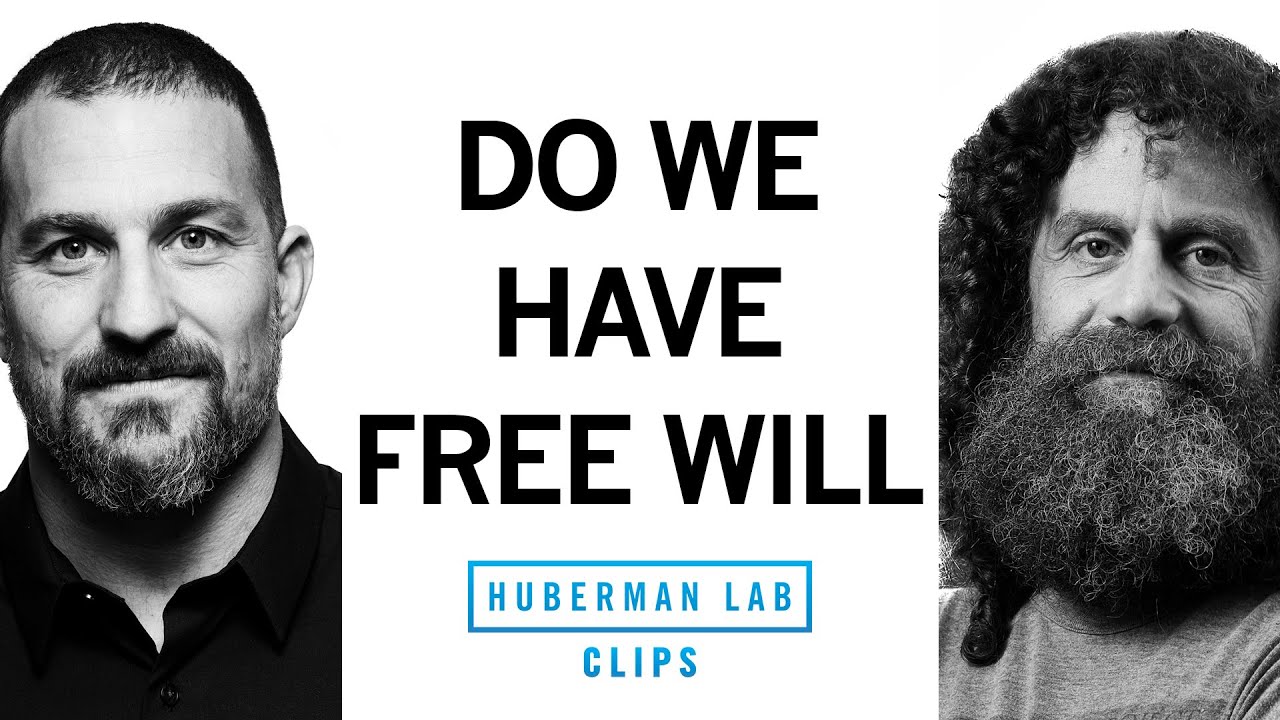Do We Have Free Will? | Robert Sapolsky & Andrew Huberman
Unleash Your Creative Genius with MuseMind: Your AI-Powered Content Creation Copilot. Try now! 🚀
In the grand theater of life, one of the most captivating and enigmatic acts is the concept of free will. It's the magical spark that seemingly empowers us to make choices, chart our own destinies, and live life on our terms. But, dear reader, prepare to have your preconceptions challenged as we delve into this provocative arena, guided by the unorthodox perspective of a renegade thinker.
The Provocative Paradox
Let's begin with the audacious claim that we may not possess an ounce of free will. Now, I know that might sound heretical to some, considering the majority of philosophers and a sizable chunk of neuroscientists stand firmly on the side of free will. But take a moment to consider the tangled web of influences that shape our every action.
Imagine making a choice, any choice. What propelled that decision? Was it the sensory environment you occupied just moments before? The cocktail of hormones coursing through your veins that morning? Perhaps it was the sum total of the past three months – a mix of wonderful moments and stressors – all playing their part. It might even be linked to the hormone levels you were exposed to as a fetus. And don't forget the culture and upbringing that your ancestors bestowed upon you as a gift and a burden. All these elements merge into one, a swirling maelstrom of influences, leaving no room for an isolated kernel of free will.
When you attempt to dissect behavior through the lens of evolution, you inevitably find yourself dancing with genetics. Genes dictate brain construction, which, in turn, encodes the proteins that control behavior. Even your current mood disorder is intricately tied to the sense of efficacy you developed as a five-year-old. The point is, it's all interconnected.
In this intricate web of influences, there's simply no space for the concept of free will to reside. It's not a visitor in your brain; it's of your brain. So, here we find ourselves, navigating a complex web where the illusion of free will may be our most cherished and yet most misleading mirage.
The Domino Effect
You may wonder if, amidst this sea of determinism, there's a lifeline, a way to intervene in this grand domino effect. Can you, armed with the knowledge that genes, epigenetics, hormones, and history play their parts, claim a small shard of free will? Can you whisper to the deterministic winds, "Not today, I shall steer this ship"?
But, dear reader, prepare for another surprise. The notion that we can change ourselves is where the train goes off the rails. We can't, because there's no free will to will it. We can, however, be changed by circumstance.
Let's take a cue from the humble Aplysia, a sea slug that learns to retract its gill when confronted with a shocking tail experience. Through conditioning, its behavior transforms under environmental pressure. Now, think about global crises or personal challenges – the moment you hear of despair and feel a pang of helplessness, both your behaviors are altered.
Surprisingly, it's the same neurobiology at play. The intricate pathways are identical, albeit in a vastly more sophisticated context. Knowing that change is possible, even if we cannot initiate it consciously, transforms our brain's response to optimistic stimuli. It leads us down a path of seeking uplifting information and drives us to be inspired by the likes of Nelson Mandela and Martin Luther King. The realization that change can happen reshapes our neurochemistry, guiding us toward optimism instead of despair.
In this grand symphony of change, it's essential to understand that change is not impossible. It might be arduous, but it's not futile. Circumstances can evolve, and striving to become better human beings remains a noble and worthwhile pursuit.
The Ultimate Paradox
So, in conclusion, the enigma of free will persists. We may not wield it as an independent force, but we can dance to its tune within the orchestra of life. We can embrace change, knowing that we are both the products and the molders of our biology and environment.
In a world where the boundaries of free will blur, where we acknowledge the deterministic forces at play, we find a glimmer of hope. We can be the agents of change by allowing the knowledge of our mechanistic nature to guide us toward optimism, resilience, and a better version of ourselves.
The illusion of free will remains, but it's not the absence of choice. It's the acknowledgment that our choices are the culmination of an intricate, interconnected tapestry – a tapestry where we can still weave the threads of our destiny.

Related Recaps
- Tập 35 Trảm Yêu Trừ Ma, Bắt Đầu Thu Được Sáu Mươi Năm Công Lực FULL: Lão thiên sư thọ yến ( bốn can
- Mozart para Bebes Estimulacion Inteligencia #748 Música para Dormir Bebés, Cancion de Cuna
- Will Trump’s Harm His Chances Of Returning As US President? I Trump News LIVE | USA News | News18
- PHIM VIỆT NAM TÂM LÝ BI KỊCH GIA ĐÌNH 2023 | MỘT ĐỜI GIÔNG TỐ Tập 13 | PHIM VIỆT NAM MỚI NHẤT 2023
- Novavax shares skyrocket after company reveals job cuts